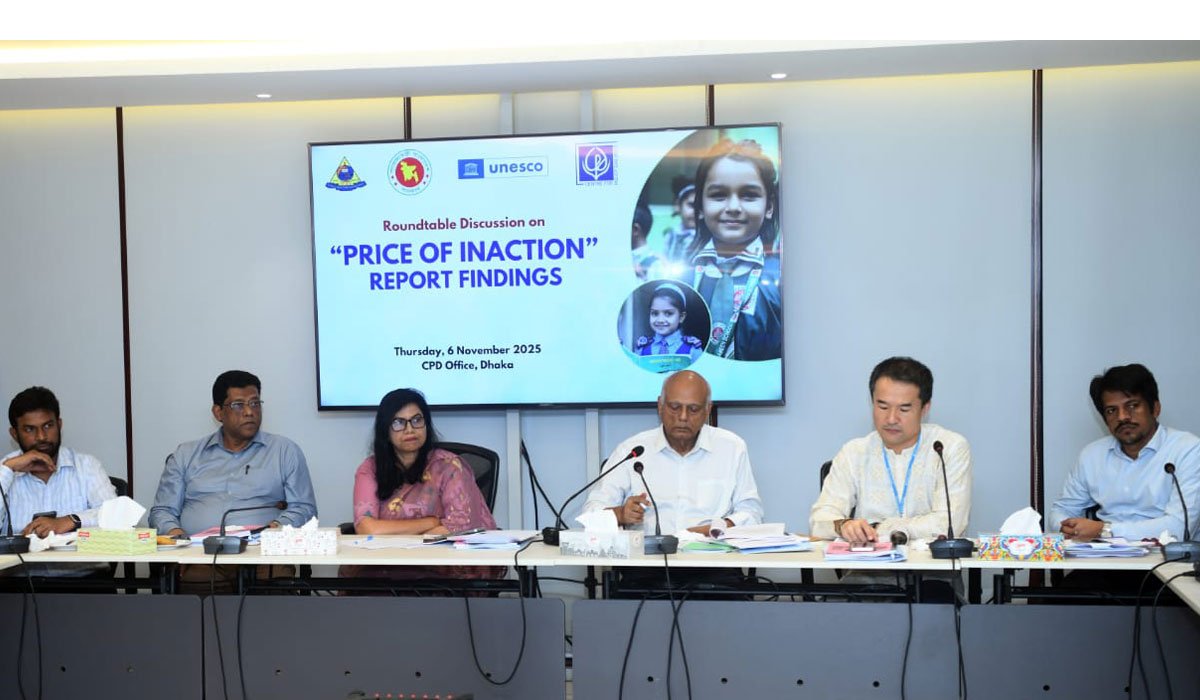
Bangladesh risks losing up to 26 per cent of its GDP if it fails to ensure basic education for all children, according to findings discussed at a high-level roundtable jointly organised by the National Academy for Educational Management (NAEM), UNESCO Dhaka, and the Centre for Policy Dialogue (CPD). The event, held on Thursday, 6 November 2025, brought together experts, educators, and policymakers to deliberate on the newly released Bangla version of UNESCO’s “The Price of Inaction: The Global Private, Fiscal and Social Costs of Children and Youth Not Learning.”
The discussion focused on the urgent need to translate the report’s recommendations into actionable policies, as the economic and social costs of educational deprivation could be catastrophic for Bangladesh’s future development.
Participants called for a bold and coordinated reform agenda, urging the government to increase education spending to at least 4–6per cent of GDP, in line with international standards. They also emphasised the need to prioritise foundational literacy and numeracy in early grades, expand gender-transformative and inclusive learning environments, strengthen teacher capacity and accountability, and ensure early childhood education for every child, especially in marginalised communities. The roundtable participants also called for the integration of skills and vocational training to boost youth employability.
Presenting the report from UNESCO headquarters in Paris, Mr Matthias Eck, Programme Specialist in UNESCO’s Section of Education for Inclusion and Gender Equality, warned that inaction would come at a staggering price. “If all children in Bangladesh had basic skills, the country could avoid a 26 per cent GDP loss,” he said, adding that even a 1per cent reduction in school dropouts could yield an annual gain of USD 630 million.
Globally, the study estimates that the cost of children leaving school early amounts to USD 6 trillion annually, and USD 10 trillion for those failing to achieve basic skills. “That’s more than the combined GDP of France and Japan,” Eck noted.
Chairing the discussion, Dr. Manzoor Ahmed, Emeritus Professor at BRAC University, lamented that while Bangladesh has made impressive gains in enrolment, learning outcomes remain worryingly low. “Half our students finish primary school without being able to read or write properly,” he said. “We have invested billions through PEDP-III and IV, yet foundational learning has not improved.”
He added, “We all know there’s a problem. But knowing is not enough — we need to act.”
A former ministry official echoed this frustration, recalling how plans to integrate foundational literacy into the PEDP-IV framework were dropped for political reasons. “Foundational literacy was supposed to be included, but it was cut because it was an election year.”
Participants repeatedly returned to the same theme — the gap between awareness and action. Dr Khairul Islam of the University of Dhaka remarked: “We all know what the challenges are, but not everyone understands them in the same way. Those making policies often don’t grasp the realities faced by teachers and children on the ground.”
A youth representative from the Sundarbans region added: “Guardians now want their children in school. But we, as teachers, are failing to inspire students to learn meaningfully. We teach for exams, not for understanding.”
Another area of concern was gender equity and safety in schools. A youth advocate highlighted that, despite a 2009 High Court directive requiring sexual harassment prevention committees in every educational institution, “most schools don’t even know such committees should exist.”
Speakers stressed that unsafe environments and gender-based violence continue to push girls out of school, compounding the dropout problem. “Education must be safe, inclusive, and empowering,” said a representative from IID’s Youth for Policy network.
Participants agreed that while policy frameworks like PEDP-IV and PEDP-V contain excellent provisions, implementation remains weak. “Without transformation in the classroom, no real progress is possible.”
Speakers urged for teacher motivation, community engagement, and scientific data collection to guide evidence-based decisions.
Dr Md Zulfeqar Haider, Director General of NAEM, called for a change in mindset: “Education is not an expense — it is the most important investment in Bangladesh’s future. We must act before it’s too late.”
The roundtable concluded with consensus on forming an action matrix to track inter-ministerial progress and ensure that the Price of Inaction report does not meet the same fate as past recommendations — well-known, but unimplemented.


